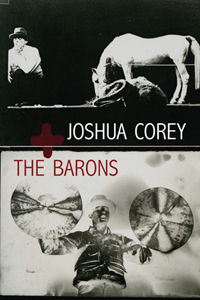Book Review
 Joshua Corey’s The Barons is a sprawling collection of poems intent on toeing the line between the profound and the glib, brainy deconstruction and guttural implosion. These poems are like toys cranked up to the point of breaking or like hurricanes whipped into speed and spinning furiously in place.
Joshua Corey’s The Barons is a sprawling collection of poems intent on toeing the line between the profound and the glib, brainy deconstruction and guttural implosion. These poems are like toys cranked up to the point of breaking or like hurricanes whipped into speed and spinning furiously in place.
In The Empire of Neomemory, Heriberto Yépez puts pressure on a representative and fragmentary poetics that extracts images from diverse contexts to rearrange them into a synoptic tableaux. This tableaux stands in for everything; it is a map of the universe that is a projection of, and screen from, the self that simulates company: “The most damaging spectacle, the most murderous, the most distracting, the most terrible, and at the same time the most poetic, most comfortable, occurs, in each moment, in the personal artifices of our minds. When we believe we are directly linked with the other.” Corey’s poems gleefully abuse this belief of authentic connection through multiple media, poetry included. This line, for instance, is surely in reference of Billy Collin’s oft quoted naturalization of English prosodic systems: “If I refuse the myth of mother’s heartbeat stacking iambs by the curb?” Elsewhere, his lines sweep up romantic landscape painters with cinema, the Debordian image of the audience united by their gaze upon an external spectacle:
a Turner reality a Whistler’s frost of decadence
filming whipped grays and blacks, indicative of sea
fog rushing the viewer’s 3D-glasses slack.
Corey punctures representation, here a romantic landscape transversing media, by bending the gaze of the reader back to the frame or in the case of poetry, the medium of language itself.
His poems are often marked by extreme degrees of internal rhyme and thick dollops of alliteration and sound play. The sonic texture is almost baroque at points. The effect is something like tap dancing in yogurt:
Milked mercurial notion clouding the future’s future
in the mind of an immigrant’s child setting up shop
in postwar firmament.
In this passage, a sort of sonic chiasmus of the “m” and “f” sounds complicate the stanza’s forward movement as it constantly displaces the time and place of the sentence’s subject.
The title poem “The Barons” brings these impulses together most successfully. It enacts a burning of the American landscape in four parallel fire lines that collate the poetic line with the practice of backburning in forestry. Over and over Corey’s poems seem to ask “How can we forget?” while salvaging the materials with which to pose this question from the debris of what we call our intellectual and artistic inheritance. Timothy Donnelly’s 2010 The Cloud Corporation might be a fitting analog: the speaker is in a position of burnt-out privilege, analytic and self-implicating. While Donnelly’s lines are soaked with ketamine-like languor, Corey’s are on speed—and angry. Beneath each punch line is a barrel of acid. Though for a collection that wears its learning on its sleeve, it is, curiously, most affecting when it breaks down into howls that register Corey’s disgust with something without analyzing the reasoning behind this disgust. “Owaagh, the blurbs” may be my favorite opening line of the year.
 Beautiful Soul: An American Elegy is meta-noir. The ostensible plot: Ruth has hired detective Lamb to track down her mother who, terminally ill and refusing treatment, has fled to Europe. The other plot: How do we make meaning and what do we make it from? To dramatize this quandary, Corey presents Ruth as the “new reader” and her mother as the “old reader.”
Beautiful Soul: An American Elegy is meta-noir. The ostensible plot: Ruth has hired detective Lamb to track down her mother who, terminally ill and refusing treatment, has fled to Europe. The other plot: How do we make meaning and what do we make it from? To dramatize this quandary, Corey presents Ruth as the “new reader” and her mother as the “old reader.”
If this seems cerebral, it is; the first half of the novel expends its energies reminding us that it is a piece of artifice. Corey compensates with lyrical prose in which sentences often unwind over the course of an entire page. At its best, even while Beautiful Soul points to the frame, its subjects take on the meditative depth of a Vermeer, whether in a chilly Chicago office space, an apartment in Paris, or a suburban kitchen.
Like The Barons, Beautiful Soul is about memory and its relations but heightens the stakes through the reader’s identification with Ruth, a sympathetic character who is stranded on a suburban island to raise a child and make meaning of her own mother’s disappearance. It’s not a pot-boiler, and yet the book springs to life in a wholly unexpected fashion through the hundred page monologue of a student artist swept up in the student activism in Paris in ’68. There is a heady concreteness to this part of the narrative in which the student’s desires are palpable; he desires M, Ruth’s enigmatic mother.
The final movement of the novel treats this anchoring narrative like a piece of evidence upon which to stake its analysis. The boundaries between characters and their relationships become a blurry tangle, eclipsed by a persistent line of inquiry around memory, family, identity, and happiness:
What is the “I” that intrudes incessantly in this narration like punctuation? If chapters were commas then readers would ride….That this is my story through a glass darkly. That it’s my history like a concealed weapon, maybe it’s there and maybe it’s not, you can’t relax till the showdown comes. Pistols, heartbreak at dawn. Forget the future, forget the glaciers melting and the sleepless nights, what about a sustainable past to go foraging in, secure enough to forget?
Metafiction has been around since at least Don Quixote and Tristram Shandy. At its worst in Beautiful Soul, the breaking of the fourth wall obscures the reader’s stake in the narrative. Passages such as these feel less like the enlivening shock of the marbled page’s sudden appearance in Tristram Shandy or the paratextual play of House of Leaves and more like notes on what a metafictional gesture might accomplish.
Regardless of such concerns, in both texts Corey attempts a daring balancing act in which the text explicitly acknowledges its own medium while also losing itself in the lyrical babble of signification. While Beautiful Soul’s oscillation between fiction and metafiction can seem somewhat slow footed, the rich sonic textures of The Barons produces a dynamic friction that simultaneously accompanies the poems’ semantic content.
About the Reviewer
Joe Hall is the author of three books of poetry: Pigafetta Is My Wife (Black Ocean 2010), The Devotional Poems (Black Ocean 2013), and, in collaboration with Chad Hardy, The Container Store Vols I & II (SpringGun 2012). He currently resides and collaborates with fellow poet Cheryl Quimba in Buffalo, New York where he is studying commons, waste flows, and poetics.